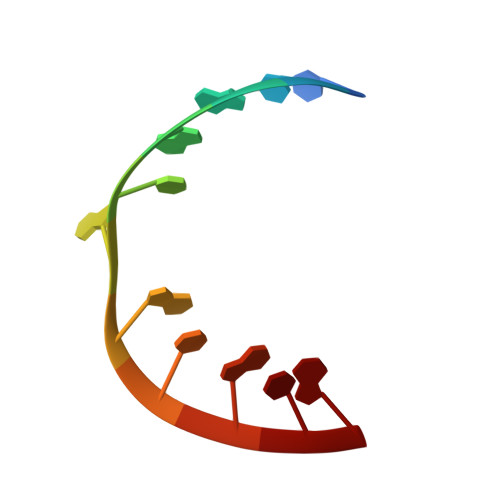Design, Optimization, and Study of Small Molecules That Target Tau Pre-mRNA and Affect Splicing.
Chen, J.L., Zhang, P., Abe, M., Aikawa, H., Zhang, L., Frank, A.J., Zembryski, T., Hubbs, C., Park, H., Withka, J., Steppan, C., Rogers, L., Cabral, S., Pettersson, M., Wager, T.T., Fountain, M.A., Rumbaugh, G., Childs-Disney, J.L., Disney, M.D.(2020) J Am Chem Soc 142: 8706-8727
- PubMed: 32364710
- DOI: https://doi.org/10.1021/jacs.0c00768
- Primary Citation of Related Structures:
6VA1, 6VA2, 6VA3, 6VA4 - PubMed Abstract:
Approximately 95% of human genes are alternatively spliced, and aberrant splicing events can cause disease. One pre-mRNA that is alternatively spliced and linked to neurodegenerative diseases is tau (microtubule-associated protein tau), which can cause frontotemporal dementia and parkinsonism linked to chromosome 17 (FTDP-17) and can contribute to Alzheimer's disease. Here, we describe the design of structure-specific lead small molecules that directly target tau pre-mRNA from sequence. This was followed by hit expansion and analogue synthesis to further improve upon these initial lead molecules. The emergent compounds were assessed for functional activity in a battery of assays, including binding assays and an assay that mimics molecular recognition of tau pre-mRNA by a U1 small nuclear ribonucleoprotein (snRNP) splicing factor. Compounds that emerged from these studies had enhanced potency and selectivity for the target RNA relative to the initial hits, while also having significantly improved drug-like properties. The compounds are shown to directly target tau pre-mRNA in cells, via chemical cross-linking and isolation by pull-down target profiling, and to rescue disease-relevant splicing of tau pre-mRNA in a variety of cellular systems, including primary neurons. More broadly, this study shows that lead, structure-specific compounds can be designed from sequence and then further optimized for their physicochemical properties while at the same time enhancing their activity.
- Department of Chemistry and Neuroscience, The Scripps Research Institute, 130 Scripps Way, Jupiter, Florida 33458, United States.
Organizational Affiliation:


















